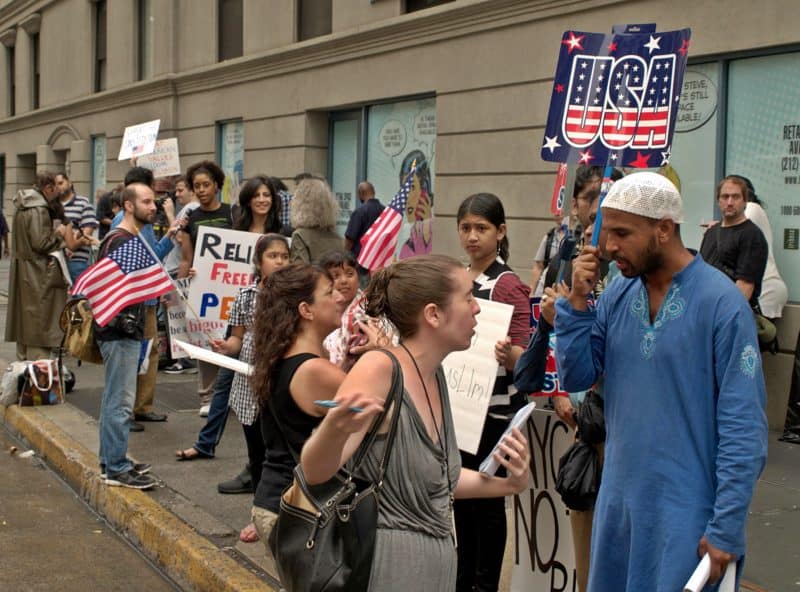It took Muslims a full three months to figure out a strategy to counter the campaign against Cordoba House, otherwise known as “the Ground Zero Mosque.” This time around, it took about three hours.
I’m referring to the lighting-fast organizing that took place once word got out that Lowe’s had pulled its ads from All-American Muslim, pressured by the Florida Family Association who were disappointed that the show didn’t offer enough airtime to Muslim extremists (That’s true by the way. You can’t make this stuff up).
The hashtag #loweshatesmuslims lit up the Twitter-sphere, thousands of people threatened to boycott, mainstream television channels started reporting on the story, star power in the form of Perez Hilton and Russell Simmons jumped on board.
Lots of other people have weighed in on the bigotry at play here. I’d like to comment on a somewhat different dynamic: the Americanization of the Muslim community, especially the immigrant segment. A community that not long ago wanted only the comfort and confinement of its own bubble is learning the great American art of building bridges.
There are bridges of three sorts being built.
The first bridge is to the influence-centers of American society. In the immediate aftermath of 9/11, there were hardly any Muslims on television saying, “What you just saw was not Islam, it was just evil.” That’s not because Muslims weren’t thinking those things, it’s just that very few of us knew anything about American media or politics. That’s the moment most Muslims realized the bubble was a mistake. Muslims started becoming writers and organizers, and got savvy about media and politics.
The anti-Ground Zero Mosque campaign showed that it’s not enough to have a bridge to the influence-centers in American society, we needed the ability to respond rapidly. If the #loweshatesmuslims campaign illustrates anything, it’s that Muslims will never be Ground Zero Mosque-d again.
You cannot ask from others what you are unwilling to give.
The second type of bridge being built is the internal one, within the Muslim community. All-American Muslim generated a lot of controversy amongst Muslims, a good deal of it from more traditional believers who didn’t like the community represented by people sporting tattoos and hanging out in clubs. But once Lowe’s pulled its advertising, even high-profile orthodox Muslims like Yasir Qadhi showed their outrage at the hardware chain, and thus their implicit support for the show.
Muslims, like every religious community, have a dizzying number of internal differences—theological interpretations, political persuasions, levels of observance, etc. These differences have long dominated discourse amongst Muslims, causing ugly divisions and an unhealthy blindness to the gathering storm from without. But now that the storm is upon us, we are banding together. Muslims of one sort who might otherwise actively denounce Muslims of another sort are now finding themselves supporting one another, all under the canopy of what I call “Big Tent Islam.” There is a blessing to the forces of prejudice being so brutal and blatant: it’s uniting Muslims.
The final type of bridge is to other communities. Perez Hilton, who proudly wears the label “the internet’s most notorious gossip,” has shone his large and lurid spotlight on the issue. The hip hop mogul Russell Simmons has been tweeting and writing about the campaign and even went so far as to buy all the advertising space on the show. Perez Hilton is gay, Russell Simmons is black. Both have witnessed discrimination against their own communities and are therefore quick to jump to the aid of others who suffer the same. And they are not the only ones. The first tweet that Lowe’s responded to over the controversy was from interfaith activist Chris Stedman, who happens to be a gay atheist.
Bridges run two ways, especially the bridge to other communities. Muslims are indeed the victims of ugly prejudice, but we are far from the only ones. The vicious attacks on the Mormon faith in the presidential campaign, the continuing bullying of gay kids in schools—there’s lots of ugliness out there. Where are Muslims when it comes to other people’s suffering?
You cannot ask from others what you are unwilling to give. I know that Muslims are grateful that black hip hop visionaries like Russell Simmons, gay pop icons like Perez Hilton, and so many others are going out on a limb for us. But that’s simply not enough. You have to offer what you seek.
Having a reality show called All-American Muslim doesn’t make you American, not in the George Washington-Jane Addams-Martin Luther King Jr sense at least. Mobilizing to defend your own rights is a start. But if we want to go all the way to the heart of this nation’s greatness, we have to follow in the footsteps of Perez Hilton, Russell Simmons and Chris Stedman. We have to do for others what they are doing for us, at the same scale, with the same profile, even if it’s risky and uncomfortable.
The single most American thing you can do is stand up for someone else.
This post originally appeared at BeaconBroadside.com.

